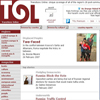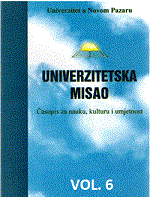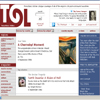


Keywords: EU; Russia; illegal immigration; prostitution; former Soviet republics; Commonwealth of Independent States (CIS); human trafficking
Fearing that the increasing tide of illegal immigrants and trafficked people into Russia could be heading its way, the EU presses Russia to tighten its borders – and possibly makes things worse.
More...
Keywords: Kosovo; street violence; demonstration; movement Vetevendosje (Self-Determination); war veterans; UN; Ulpiana Lama; government spokeswoman; Prime Minister Agim Ceku;
Deadly street violence offers a hint of the tension in Kosovo as talks on its future enter the nail-biting stage.
More...
Keywords: Russia; regional elections; St. Petersburg; Electoral Commission; Dmitry Krasnyansky; Grigory Yavlinsky; the Yabloko leader; pro-Kremlin party; United Russia;
Opposition parties are being shut out of Russian regional elections for reasons that would make Kafka smile.
More...
Keywords: Bosnia; Office of the High Representative (OHR); Peace Implementation Council; Dayton peace accords since 1995; Bonn Powers; Stabilization and Association Agreement with Brussels; EU;
Bosnia is ready to move on to the next stage of its development. Is the international community?
More...
Keywords: filozofija; um; etika; aksiologija; kultura; fenomenologija; idealizam; ideologija; totalitarizam; staljinizam; moderni građanski svijet; kritika; ethos; ljudsko bistvovanje
Autor u ovoj studiji razmatra više aspekata Muminovićeve kritičke filozofije. Riječ je o analizi opusa jednog od najkompleksnijih, uz Muhića i Filipovića, bošnjačkih i balkanskih mislilaca XX stoljeća. U fokusu istraživačkog postupka, pisac je posebno usmjerio pažnju na Muminovićev epistemološko-dijalektički i kritičko-konstruktivni metod u filozofiji. Zatim, razmatrao je njegovo etičko gledište kao ljudsko bivstvovanje, što predstavlja u biti jedno osobeno razumijevanje filozofije ideologije i moderniteta. U tom kontesktu, Muminović se predstavlja, kao veoma egzistencijalan mislilac, koji svojim djelima promišlja dijalektiku mišljenja, posebno povezuje recepciju Blohovih principa nade do aktualne kritike totalitarizma, što je predmet njegovog životnog djela „Zarobljeni um.“ Upravo, Muminovićeva kritika totalitarnih režima, omogućava modernom čitatelju, da prepozna recidive neostaljinizma i neofašizma u današnjem svijetu. Upravo ova dimenzija Muminovićevog kritičko-filozofskog diskursa, mu daje takvo visoko mjesto, ne samo u bošnjačkoj već i u europskoj filozofskoj misli, pa možemo slobodno konstatovati, da je riječ o jednom od posljednjih velikih europskih filozofa (koji je rođen u Sandžaku, a svoju afirmaciju je postigao kao profesor filozofije i etike na Sarajevskom univerzitetu). Ključni aspekti Muminovićeve kritičke filozofije se ogledaju kroz poimanje uvođenja u filozofsko mišljenje, razumijevanje etičkih fenomena, kritika ideologije (posebno staljinske), te filozofije praksisa i drugih. Zato svijet Muminovićeve filozofije, privlači pažnju mnogih istraživača, jer je po svojoj prirodi ne samo kritička, već idejno originalna, čime su mu ukazana posebna priznanja, osamdesetoih godina XX stoljeća, kako od kolega iz beogradskog, tako i zagrebačkog filozofskog kruga. Na ovaj način, autor nastoji da otvori filozofski sistem dr Rasima Muminovića i predstavi ga širem krugu kolega i drugih čitatelja.
More...
Keywords: Islamsko pravo; šerijat; demokratija; ljudska prava; slobode
Sistem ljudskih prava i sloboda u političkom islamsko sistemu ima svoju ideološku filozofiju utemeljenu na islamskoj doktrini – akidi, iz kojeg se derivira islamsko pravo –Šerijat koji svojim normama i propisima regulira ta prava i slobode i to na način da u isto vrijeme osigurava i štiti obje dimenzije ljudskih prava i interesa: i individualnu i kolektivnu. Filozofija prava i slobode u islamu ima svoju posebnu prirodu i specifičnosti. Na prvom mjestu se prava i slobode u islamu smatraju Božijim darovima, izvedena iz islamskog prava - Šerijata i utemeljeni na islamskoj doktrini - akidi. A to za posljedicu opet ima da ona kod sljedbenika islama uživaju u velikoj mjeri svetost i poštovanje, što im opet daje garanciju da će ih se dobrovoljno i u istoj mjeri pridržavati i država i njeni građani. I to je bez sumnje najbolji metod i sistem da se zaštite, ne podcjenjuju i ne gaze. Osim toga, prava i slobode u islamu nisu podložna nikakvoj konfiskaciji a niti derogaciji, jer to je u islamskom pravu apsolutno ne izvodivo kako je to već u studiji i objašnjeno. Također, prava i slobode u islamu imaju karakter univerzalnosti i općenitosti, jer obuhvataju sve vrste prava i sloboda i odnose se na svakog muslimana ili nemuslimana koji živi u okrilju islamske države i smatra se njenim državljaninom. Isto tako, prava i slobode u islamu su legalizovana, utemeljena i upotpunjeni odmah na početku islama, za vrijeme poslanika Muhammeda, a.s. I to onda kad ostali svijet, na polju teorije političkih sistema kao i na segmentu teorije ustavnog prava, uopšte nije poznavao nešto što se nazivalo teorijom ljudskih prava i sloboda. I na kraju, prava i slobode u islamu nisu apsolutni, nego su sputani određenim pravilima i ograničenjima kako bi se osigurao i štitio opći ljudski interesi i dobrobiti.
More...
Keywords: Republic of Latvia; Latvian-language; Stalin’s Russification campaign; USSR; discrimination; Russia; ethnic segregation;
Russian-language activists plan further protests against the Latvian law mandating bilingual education. A former Latvian diplomat argues they are doing themselves and their country a great disservice.
More...
Keywords: Nazi Germany; Poland; history; anniversary; German Chancellor Gerhard Schroeder; War Compensation; Erika Steinbach;
The anniversary of a fateful day for two nations brings painful memories, renewed claims and counter-claims, and reconciliation.
More...
Keywords: Russian Orthodox Church; religion; school; Muslim; Jewish; Buddhist; Pope John Paul II; Cardinal Walter Kasper;
As a new school year begins, Moscow authorities have reignited the long-running debate over religious education in schools.
More...
Keywords: Former Yugoslav President; Slobodan Milosevic; ICTY; Vladimir Krsljanin; court; law; human rights; war crimes; genocide;
The ICTY imposes a defense counsel on a defiant Milosevic.
More...
Keywords: Beslan; Russia; Chechnya; Caucasus; Ossetia; Ingushetia; hostage; war; crimes; Putin; terrorism; Dubrovka;
The unspeakable crimes in Beslan should change Russia's policy toward Chechnya. But there seems little chance of that.
More...Keywords: Timişoara; Corso; Lugoj; Caransebeş; Oraviţa; balls; clubs; cafes - aspects of Banat; the life of Romanian cities;
The two pages featured in this issues under the "Together" heading feature excerpts from the research conducted by Smaranda Vultur. The subtitle is highly relevant: "Banat - Town Life Through Biographical Itineraries" takes the reader on a spiritual journey through the various aspects of Banat, as seen at various moments in history by some of its inhabitants. The interviews have been taken by Adrian Onică, adriana Roşioru, Voichiţa Năchescu, Roxana Pătraşcu and Smaranda Vultur.
More...Keywords: autobiography; cultural heritage; Jewish writing; polemical response; dramatic histories; ethnical appartenance; literary creation; controversy
Cristina Chevereşan reviews two volumes that seem to have put together the bulk of the most important articles ever published with regard to Mihail Sebastian's controversial figure."Sebastian Under the Judgement of Time. The Solitude and Vulnerability of the Witness" and "The Mihail Sebastian File" are the two works edited by the Universal Dalsi Publishing House, Bucharest. The reviewer tries to summarize the most important trends that appear in an impressive mass of contradictory information, indicating to the reader the most elloquent contributions and the main issues of the ever ongoing debate.
More...Keywords: Timişoara; self-made man; From Timişoara to Vienna; opera-manager; personal myth; pragmatism; Livius Ciocârlie; cultural leadership; Ioan Holender;
Cornel Ungureanu starts the evocation of a legedary figure in the culture of Timişoara (and Europe, in general) from Ioan Holender's event-book, "From Timişoara to Vienna", a superb volume tracing an exceptional - both personal and historical - evolution. The successful head of the State Opera in Vienna is portrayed as the most photogenic man in the history of Timişoara, author of the most beautiful book dedicated to this town and creator of a special international and interpersonal relationship between Romanian, Austrian and European cultures.
More...Keywords: community memory; life stories; interviews; deportations; historical and anthropological approach; diversity; identity defining factors
Otilia Hedeşan reviews a compehensive volume coordonated by Smaranda Vultur: "The Saved Memory: The Jews from the Banat Area, Today and Yesterday". The premises of the researcher are highlighted and discussed in detail, the book being recommended as a most thorough investigation into the personal and historical fascination given by life stories as means of retracing community memory.
More...Keywords: Krakow; Auschwitz; train trip; Soljhenitzin; Schindler's List; Claude Lanzmann; Shoah
The first article represents a personal testimony of the emotions experienced by a zoung Romanian journalist on his first and second visit to Auschwitz. The text, written in the manner of an indirect diary, constitutes an undeniable and extremely powerful proof of the impact the horrid events of world history still have on the rebuked onloohers. The second text reviews Claude Lanzmann's book "Shoah", a touching and magical rendition of the dramatic poem written in blood by the thousands ofJews exterminated in concentration camps all over Europe.
More...Keywords: aphorisms; death; writing; curiosity; scepticism; beggars; immortality; confessions; melancholy; insensitivity
Having rounded up the cycle of Comments on Canetti, Livius Ciocârlie inaugurates a new series of "comments"; this time, the discourse focuses on the works of Lichtenberg. As usual, the Romanian essayist offers a personal, deep insight into the denotative and connotative mysteries of the literary work. Ciocârlie's "notes on being" continue to impress by means of the openness of his critical and emotional views.
More...Keywords: Mircea Pora's writing; armchair;
The first page of this issues "Fiction &Co." section offers a sample of Mircea Pora's writing. The excerpt entitled "The Armchair" is structured as an interview taken to a professor whose existence seems to have been dominated by a special relationship with the word "armchair". The surreal feeling exterted over the reader makes this short prose piece utterly enjoyable.
More...Keywords: countryside; peasants; engagement; sunlight; horizon
In light of the future opening of the "Danilo Kis" Literary Cafe in the center of Timişoara, this issue's last page is dedicated to the well-known Serbian writer. The readers can enjoy an excerpt from his "early Sufferings" volume, in the Romanian version provided by Iasmina Petrovici.
More...